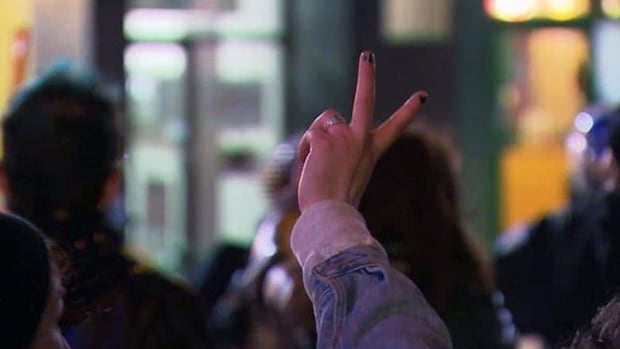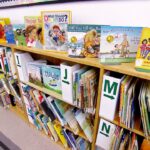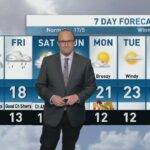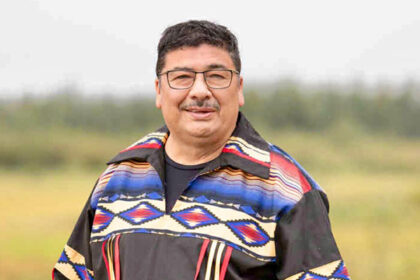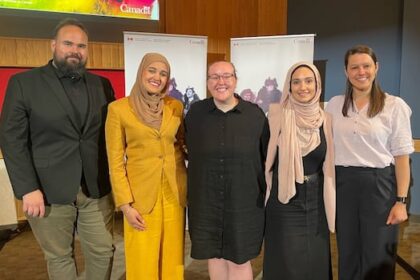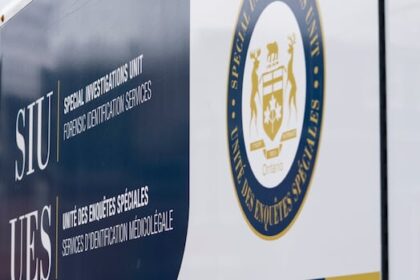ManitobaInclusive Peace, now two and a half years underway, digs into the hard questions, says Brandon University political scientist Allison McCulloch. their mission is to study how deeply divided societies rebuild after violent conflict — and how those lessons can apply globally.Researchers warn democracy needs dialogue to surviveChelsea Kemp · CBC News · Posted: Sep 18, 2025 6:00 AM EDT | Last Updated: 3 hours agoBrandon University political scientist Allison McCulloch says Inclusive Peace has been a multi-year, internationally funded collaboration with the mission of studying how deeply divided societies that have faced conflict can rebuilt. (Chelsea Kemp/CBC)In an era of rising polarization and political violence, people in Brandon heard from a group of international researchers exploring a different path — inclusive peace.A panel discussion at Brandon University on Wednesday evening — Designing Inclusive Peace — was part of a multi-year, internationally funded collaboration bringing scholars from around the world. Political scientist Allison McCulloch, who teaches at Brandon University, says their mission is to study how deeply divided societies rebuild democratic and inclusive institutions after violent conflict — and how those lessons can apply globally.”The world is increasingly violent,” she said, pointing to the more than estimated 60 active conflicts worldwide.At the same time, she says, there are fewer comprehensive peace settlements and fewer personnel deployed on peace operations.”This is precisely the moment where we need more inclusive peacemaking, peace-building projects,” she said.Anthony Tutugoro of University of New Caledonia says every country faces division — the key is ensuring everyone has a voice in government. (Chelsea Kemp/CBC)McCulloch says the project, now 2½ years underway, digs into the hard questions, like how people can live together despite deep divides, how elections can include rather than exclude, and how polarization can be managed rather than allowed to fracture societies.”It feels particularly urgent right now … It’s not just that we’re divided on policy issues,” McCulloch said. “At a global level, there are questions around different types of government … what the government in the U.S looks like, and what does that mean for Canada and what does it mean to have these kinds of pressures put on democratic systems around the world?”For BU political science student Alyanna Gungon, the conversation hit close to home.”Right now, I feel that politically the world is kind of going to shambles. It’s scary, it’s distressing,” she said.Gungon said peace has long been tied to Canada’s identity as a peacekeeping nation, and understanding global conflicts is vital for her generation.”Even my friends who weren’t interested in politics before … are tuning in,” she said. “Through social media and through horrific accidents and tragedies … it’s like important to all of us.”Lessons from abroadVisiting researcher Anthony Tutugoro from New Caledonia — a French colonial territory in the South Pacific — spoke about case studies of societies split along ethnic, religious or linguistic lines.”Every country is divided,” he said. But, in deeply divided societies, the challenge is ensuring all groups — not just the majority — have a voice in government.Megumi Kagawa of Waseda University in Japan says building bridges between divided groups starts with small steps. (Chelsea Kemp/CBC)Drawing on his own home’s history, he pointed to peace agreements in 1988 and 1998 that helped stabilize New Caledonia after years of internal conflict. The project, he says, compares examples like these to uncover what makes agreements succeed or fail.Representative democracy, he added, must evolve.Education and media literacy, he said, are key to helping citizens participate constructively.”It will have to involve citizens more, rather than just once every five years for an election,” he said. Building bridgesMegumi Kagawa of Waseda University in Japan emphasized starting small.”You can’t go inclusive from the beginning,” she said. “You begin in each community, find someone who can bridge to another group, and build step-by-step.”Her research involves listening first, especially to groups often excluded from peace processes.”If you listen without judgment and share knowledge, people begin to accept you. That’s how we try to build bridges.”Brandon University political scientist Valentino Grbavac says todays fragmented media environment can make it harder to build unity. (Chelsea Kemp/CBC)Echoing this philosophy, BU political scientist Valentino Grbavac says it can take years to heal from generations of division. He pointed to the group’s research cases to learn how democracies can include divided groups and avoid sliding into conflict.”You can’t reform certain processes overnight,” he said. Even in non-deeply divided democracies, it’s challenging to reform the political system. That means taking changes step-by-step and consulting citizens along the way to create lasting peace.But today’s fragmented media environment, he noted, makes it harder to build unity.”It’s really hard to get a perspective outside of your bubble and also know what’s true and what’s not,” he said. “It’s definitely a challenge for democracy worldwide.Learning to listenAnna Ramsey, a third-year political science student, said the panel reinforced the need for dialogue.She was struck by Tutugoro’s insights into voting behaviour in New Caledonia. It made her think of Canada’s own divisions, rooted in colonization and Indigenous-French divides.”I do think that still to this day creates a big divide here in Canada. And we see that in Parliament, we see that playing out in our government today,” she said.Gungon added that open conversation is key to resisting polarization.”It shouldn’t always end in a fight,” Gungon said. She says citizens don’t always have to agree at the end of the day, but they should understand where the other person is coming from.For her, a healthy democracy means ensuring everyone has a voice.”We are all Canadians, and I think every Canadian should have a seat at the table to share their thoughts and opinions,” she said. “We are all different people, but we share this land together and it’s important that we all have a say.”ABOUT THE AUTHORChelsea Kemp is a multimedia journalist with CBC Manitoba. She is based in CBC’s bureau in Brandon, covering stories focused on rural Manitoba. Share your story ideas, tips and feedback with chelsea.kemp@cbc.ca.
Friday, 6 Feb 2026
Canada – The Illusion
Search
Have an existing account?
Sign In
© 2022 Foxiz News Network. Ruby Design Company. All Rights Reserved.
You May also Like
- More News:
- history
- Standing Bear Network
- John Gonzalez
- ᐊᔭᐦᑊ ayahp — It happened
- Creation
- Beneath the Water
- Olympic gold medal
- Jim Thorpe
- type O blood
- the bringer of life
- Raven
- Wás’agi
- NoiseCat
- 'Sugarcane'
- The rivers still sing
- ᑲᓂᐸᐏᐟ ᒪᐢᑿ
- ᐅᑳᐤ okâw — We remember
- ᐊᓂᓈᐯᐃᐧᐣ aninâpêwin — Truth
- This is what it means to be human.
- Nokoma


